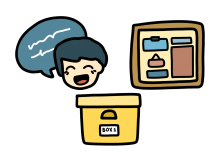When designing an oral history project, do not neglect to include a mid- and long-term plan for care, preservation, and access to the records you create. Consider where to store your files and who is responsible for the long-term management of these files so that you and others can access them in the future.
Independent projects
It is a good idea to store your files in multiple locations to ensure redundancy and plenty of safe back-ups in case of loss. Remember: Lots Of Copies Keeps Stuff Safe (LOCKSS) (see sidebar). Examples of different types of locations include: hard drives, thumb drives, networked servers, cloud storage options like Google Drive, Dropbox, Box, etc. Document the locations for long-term storage.
- Copies of original recordings (.wav, .mp4, .mov)
- Copies of edited recordings (.wav, .mp4, .mp3)
- Transcription (.pdf)
- Signed consent forms (.pdf)
- Description of the project and owner(s) of the recordings
- Metadata (information about each recording)
- File hosting in YouTube and access via Google Sites
- Omeka or Omeka-S for hosting and access, including metadata standardization. For an example built on Omeka see: The People's Archive of Police Violence in Cleveland (see sidebar).
- Several organizations provide hosting and collaborative digital humanities tools to provide enhanced points of access for oral histories. For example: the Knight Lab at Northwestern University.
Before publishing your oral histories on a web platform, consider these long-term stewardship questions:
- Who will make sure, for the long term, that the website is secure, that it will not be tampered with, and that the urls and oral histories stay valid into the future?
- Does the narrator fully understand that their oral history will be publicly available on the internet?
The role of the project director and interviewer is to ensure that narrators are well-informed of this process and won't be surprised that their oral histories are still on the internet after many years. Thinking this through at an early stage will assist in your selection of and communication with potential narrators.
- How will a narrator or other concerned party contact you or the website administrator regarding concerns? Who will respond to concerns? For example, what process is in place if a narrator would like to remove their oral history from a digital platform?
Institutionally affiliated projects
If you have entered in a partnership with an archival institution, you will have access to more hosting and access platform options. Additionally, long term preservation and access care can also be provided by institutional staff. Be sure to discuss your project with potential archival institutions for guidelines on preparing oral histories for long term preservation and access. In many cases, a Memorandum of Understanding (MOU) can provide documentation for clarifying roles, responsibilities, and desired outcomes. See Module 2, Community Partnership section for more information about developing a MOU.
- What are the institution’s collecting areas? Does your project’s scope fit with their existing collecting areas?
- What is the institution’s relationship with the communities represented in the oral histories? Do they have examples of projects they have worked on with these communities?
- What are your expectations regarding access? Does the institution foresee any use of the materials in the project (i.e. used for class instruction)?
- How will the institution be making the oral histories available? Are they able to accommodate any embargo dates, if present?
- What relationship do I have with the institution? What about in the future?
- If you made a project website, can the institution provide web archiving services to preserve this website? This will allow you to sunset the website and point to the archived version of the site.
- What will be the ongoing relationship with the institution?
Consider these long-term stewardship questions:
- Do you (as project creator) understand the institution's processes for when a narrator changes their mind and wants their oral history taken down?
- Is the narrator clear that their oral history can be shared or republished to other websites by the institution? Are they comfortable with a partner institution having the power to make those decisions?
For example, at UC Irvine, an oral history in the Viet Stories collection that has been published on Calisphere (California Digital Library), and the Digital Public Library of America. In order to honor takedown requests, several cross-institutional partners including librarians, digital collection administrators, and IT professionals must be involved in the process.
If you intend to donate or transfer your project materials to UCI Special Collections & Archives, please contact spcoll@uci.edu.
